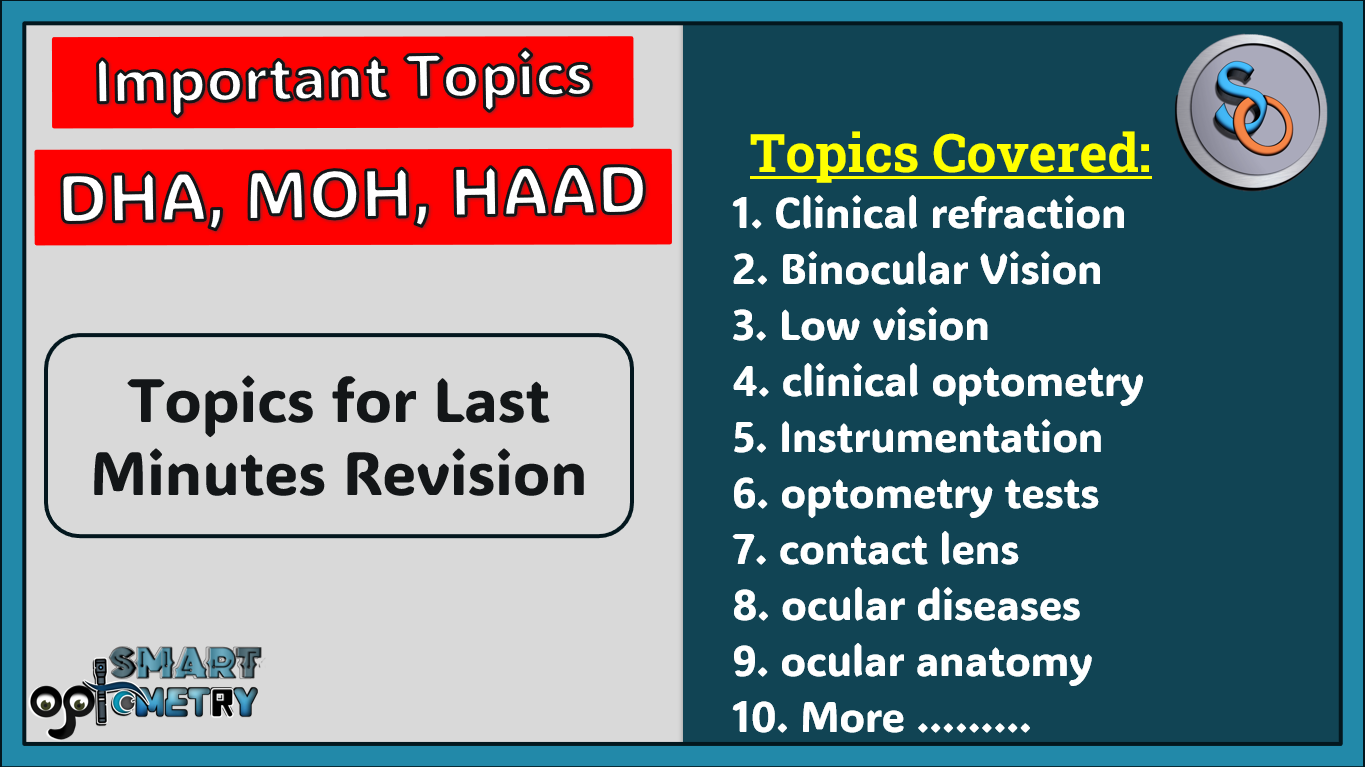Here you will get suggestions for important topics of Clinical refraction, Binocular Vision, Low vision, clinical optometry, Ophthalmic Instrumentation, optometry tests, contact lens, ocular diseases, ocular anatomy and more for preparation for DHA Optometry Exam.
It’s very short list of important topics (Syllabus) for DHA Optometry preparation:
Note: A complete course on Dubai Health Authority(DHA) exam is available in our app “Optometry Notes & MCQs”
1. Clinical Refraction (DHA Optometry):
- Refractive Error:
- Myopia,
- Hypermetropia,
- Astigmatism,
- Presbyopia
- Aphakia
- Refractive Surgery:
- Corneal,
- Lenticular,
- Implantable Collamer Lens (ICL)
- Refraction:
- Obejective Refraction.
- Subjective Refraction.
- Cycloplegic Refraction.
- Working distance calculation.
Introduction:
In the realm of optometry, a comprehensive understanding of clinical refraction is paramount for ensuring accurate diagnosis and effective management of various refractive errors and conditions. Aspiring optometrists preparing for the Dubai Health Authority (DHA) exam must familiarize themselves with a range of critical topics within clinical refraction. From the fundamentals of refractive errors such as myopia, hypermetropia, astigmatism, and presbyopia, to specialized areas including aphakia and refractive surgery, candidates must grasp the intricacies of each subject. This precise overview explores essential topics encompassing refractive errors, aphakia, refractive surgery techniques, and diverse methods of refraction assessment, including objective and subjective refraction, as well as the calculation of working distance. Let’s delve into these crucial subjects to equip aspiring optometrists with the knowledge needed to excel in the DHA exam.
Note: A complete course on Dubai Health Authority(DHA) exam is available in our app “Optometry Notes & MCQs”
2. Ophthalmic Instrumentation:
- Retinoscope.
- Keratometry.
- Ophthalmoscopy,
- Slit lamp.
- Tonometry.
- Perimetry.
- Biometry.
- Lensometer.
Mastering ophthalmic instrumentation is essential for optometrists preparing for the Dubai Health Authority (DHA) exam. These specialized tools play a pivotal role in assessing various aspects of ocular health and visual function. From the versatile retinoscope to the intricate biometry equipment, each instrument serves a unique purpose in diagnosing and managing ocular conditions. This concise introduction provides an overview of essential topics in ophthalmic instrumentation, including retinoscopy, keratometry, ophthalmoscopy, slit lamp examination, tonometry, perimetry, biometry, and lensometry. Let’s delve into the intricacies of each instrument, equipping aspiring optometrists with the knowledge required to excel in the DHA exam.
Note: A complete course on Dubai Health Authority(DHA) exam is available in our app “Optometry Notes & MCQs”
3. Optometry Tests:
- Duochrome test.
- Maddox rod, Double Maddox Rod, Maddox Wing,
- Visual acuity measurement: Near and Distance
- Worth Four Dot Test:
- Near & Distance.
- Cover test:
- Direct Cover,
- Cover-Uncover,
- Alternate Cover,
- Prism Bar Cover Test.
- Hirschberg test.
A thorough understanding of optometry tests is indispensable for optometrists preparing for the Dubai Health Authority (DHA) exam. These tests serve as vital diagnostic tools, enabling practitioners to assess various aspects of visual function, binocular vision, and ocular alignment. From the Duochrome test to the Cover test and beyond, each examination method offers unique insights into the patient’s ocular health and visual acuity. This succinct introduction provides an overview of essential topics in optometry tests, including visual acuity measurement, binocular vision assessment, and diagnostic techniques such as the Duochrome test, Maddox rod, Worth Four Dot Test, and Hirschberg test. Let’s delve into the intricacies of each test, empowering aspiring optometrists with the knowledge necessary to excel in the DHA exam.
Note: A complete course on Dubai Health Authority(DHA) exam is available in our app “Optometry Notes & MCQs”
4. Contact Lens:
- Types/Classification of Contact Lens.
- Manufacturing technique.
- Fitting & Assessment: Soft, RGP, Scleral, Ortho-K
- Properties of Contact Lens Materials
- Complication & Management.
- Insertion & Removal.
- Contact lens Solution & care.
An in-depth understanding of contact lenses is indispensable for optometrists preparing for the Dubai Health Authority (DHA) exam. Contact lenses offer a versatile solution for correcting refractive errors and managing various ocular conditions. From the classification of contact lens types to manufacturing techniques and fitting assessment, each aspect plays a crucial role in ensuring optimal vision correction and ocular health. This concise introduction provides an overview of essential topics in contact lens practice, covering classification, manufacturing techniques, fitting and assessment methods for soft, RGP, scleral, and Ortho-K lenses, as well as the properties of contact lens materials, complications management, insertion and removal techniques, and contact lens solution care. Let’s explore these critical subjects in depth to equip aspiring optometrists with the knowledge and skills necessary to succeed in the DHA exam.
Note: A complete course on Dubai Health Authority(DHA) exam is available in our app “Optometry Notes & MCQs”
5. Dispensing Optics:
- Types of lens,
- Types of frame,
- Types of lens & frame materials,
- Allergies from materials,
- Types of face in relation to types of frame,
- Properties of Lens Material: Refractive index, Abbe Value,
- Fitting technique,
- Relation of high index lens & types of frame,
- Simple and toric transposition
Comprehensive knowledge of dispensing optics is essential for optometrists preparing for the Dubai Health Authority (DHA) exam. Understanding the nuances of lens and frame types, materials, fitting techniques, and considerations related to patient characteristics is paramount for delivering optimal vision solutions. This concise introduction provides an overview of critical topics in dispensing optics, including lens and frame types, materials, properties of lens materials, fitting techniques, and considerations regarding high index lenses and frame compatibility. Additionally, it covers aspects such as allergies from materials, facial types in relation to frame selection, and techniques for simple and toric transposition. Let’s delve into these vital subjects to equip aspiring optometrists with the expertise needed to excel in the DHA exam.
Note: A complete course on Dubai Health Authority(DHA) exam is available in our app “Optometry Notes & MCQs”
6. Binocular Vision:
- Grades of Binocular Vision.
- Crossed & Uncrossed Doplopia.
- Extraocular Muscle.
- Squint evaluation.
- Prism.
A comprehensive understanding of binocular vision is crucial for optometrists preparing for the Dubai Health Authority (DHA) exam. Binocular vision encompasses the intricate coordination between the eyes, allowing for depth perception, stereopsis, and fusion of visual images. From assessing grades of binocular vision to understanding concepts such as crossed and uncrossed diplopia, optometrists must grasp various aspects of extraocular muscle function, squint evaluation, and the application of prism. This concise introduction provides an overview of essential topics in binocular vision, including grading systems, diplopia phenomena, extraocular muscle anatomy and function, squint evaluation techniques, and the use of prism in clinical practice. Let’s explore these critical subjects in depth to equip aspiring optometrists with the knowledge and skills necessary to excel in the DHA exam.
Note: A complete course on Dubai Health Authority(DHA) exam is available in our app “Optometry Notes & MCQs”
7. Ocular Diseases:
- Diabetic retinopathy,
- Hypertensive retinopathy,
- Retinopathy of prematurity (ROP)
- Glaucoma.
- Anterior & Posterior Segments Diseases.
A comprehensive understanding of ocular diseases is essential for optometrists preparing for the Dubai Health Authority (DHA) exam. Ocular diseases encompass a wide range of conditions affecting various parts of the eye, from the retina to the anterior and posterior segments. Among the key diseases encountered in clinical practice are diabetic retinopathy, hypertensive retinopathy, retinopathy of prematurity (ROP), glaucoma, and conditions affecting the anterior and posterior segments. This concise introduction provides an overview of these critical topics, exploring the pathophysiology, clinical features, diagnostic criteria, and management strategies for each disease. Let’s delve into these important subjects to equip aspiring optometrists with the knowledge and expertise needed to succeed in the DHA exam.
Note: A complete course on Dubai Health Authority(DHA) exam is available in our app “Optometry Notes & MCQs”
8. Low Vision:
- Causes of Low Vision.
- Global magnitude of low vision.
- Basic Principle of Devices
- Magnification & other Calculations,
- Low vision chart,
- Low vision aids.
A profound understanding of low vision is essential for optometrists preparing for the Dubai Health Authority (DHA) exam. Low vision encompasses a spectrum of visual impairments that significantly impact daily functioning and quality of life. From understanding the causes and global prevalence of low vision to mastering the principles of low vision devices, magnification calculations, and the use of low vision aids and charts, optometrists must possess comprehensive knowledge in this area. This concise introduction provides an overview of critical topics in low vision, exploring the etiology, epidemiology, principles of device usage, magnification calculations, and various aids and assessment tools employed in low vision rehabilitation. Let’s delve into these vital subjects to equip aspiring optometrists with the expertise needed to excel in the DHA exam.
Note: A complete course on Dubai Health Authority(DHA) exam is available in our app “Optometry Notes & MCQs”
9. Ocular Anatomy:
- Bony orbit.
- Layers of Eye in details
- Parts of eye in details.
- Visual Pathway: RAPD
A thorough understanding of ocular anatomy is fundamental for optometrists preparing for the Dubai Health Authority (DHA) exam. Ocular anatomy encompasses the intricate structures and pathways within the eye, including the bony orbit, layers of the eye, individual parts of the eye, and the visual pathway. From the protective framework of the bony orbit to the complex layers comprising the eye, optometrists must grasp the anatomical details to effectively diagnose and manage ocular conditions. This concise introduction provides an overview of critical topics in ocular anatomy, exploring the structure and function of the bony orbit, the layers of the eye in detail, the intricate components of the eye, and the visual pathway, with a focus on relative afferent pupillary defect (RAPD). Let’s delve into these essential subjects to equip aspiring optometrists with the foundational knowledge necessary to excel in the DHA exam.
Check Our Courses: Ophthalmic Instrumentation, Clinical Refraction, Contact Lens, Binocular Vision, Dispensing Optics, MCQs in Optometry
Note: A complete course on Dubai Health Authority(DHA) exam is available in our app “Optometry Notes & MCQs”




